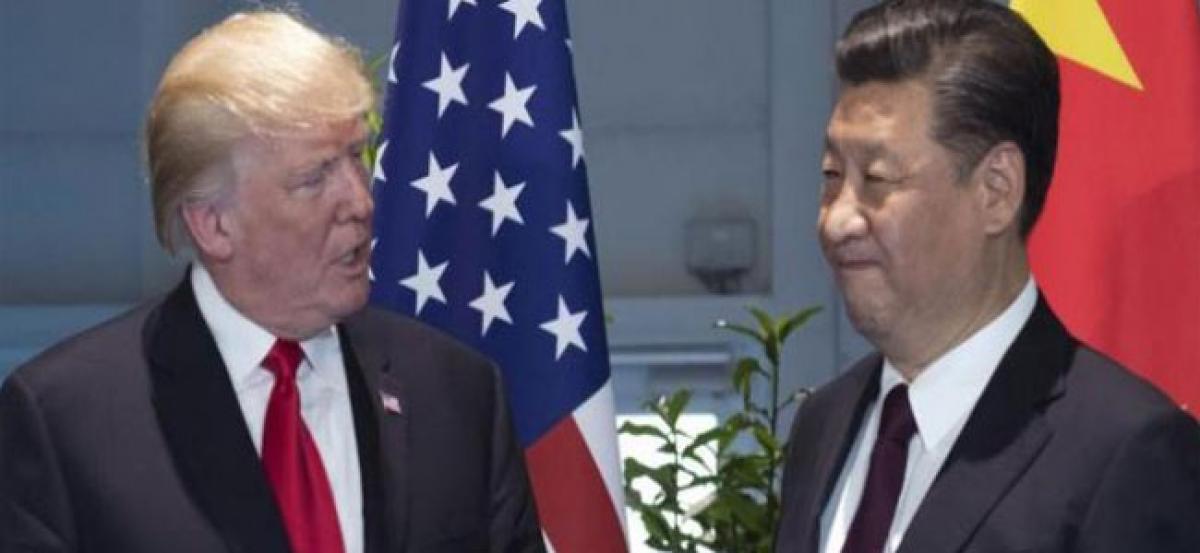Live
- Santosh Trophy: Rahman’s lone goal sees Kerala sail to semis
- World Rapid Chess Championship: Arjun tied fifth after first day
- ISL: HFC hope to turn around 5-game losing run vs East Bengal
- Devotees rush to Tirumala increases, to take 20 hours for sarvadarshans
- BGT 4th Test –Day 2: India meltdown after Jaiswal’s terrible run-out
- India women whitewash WI 3-0
- Gavaskar calls for Siraj to be dropped, says ‘Be brutally upfront’ with him
- Scholarships
- Broadening awareness about epidemic preparedness
- Single-use plastic bottles may be spreading antibiotic resistance: INST study
Just In

Punishing US tariffs on Chinese imports took effect early Friday, marking the start of President Donald Trumps trade war with the largest US trading partner and intensifying the anxieties of global industry
As tariffs approached, US central bank warned that impending trade battle was beginning to darken otherwise blue skies of American economy.
Washington: Punishing US tariffs on Chinese imports took effect early Friday, marking the start of President Donald Trump's trade war with the largest US trading partner and intensifying the anxieties of global industry.
Beijing was expected to immediately retaliate dollar-for-dollar with its own counter-tariffs after Trump imposed 25 percent duties on about USD 34 billion in Chinese machinery, electronics and high-tech equipment including autos, computer hard drives and LEDs.
The arrival of the long-threatened tariffs marked the failure of months of dialogue between the world's two largest economies and came amid hand-wringing from industry leaders who fear shrinking markets, higher prices and slower growth.
The tariffs' arrival also made real a campaign-trail pledge for Trump, who has fulminated for years against what he describes as Beijing's underhanded economic treatment of the United States.
US officials accuse China of building that country's emerging industrial dominance by stealing the "crown jewels" of American technological know-how through cyber-theft, forced transfers of intellectual property, state-sponsored corporate acquisitions and other alleged practices.
And they say the current US economic strength, as well as America's soaring trade deficit in goods, means the world's largest economy can outlast its rivals in the current tit-for-tat battle, presenting Washington with a rare window of opportunity to settle old scores.
The US trade deficit in goods with China ballooned to a record USD 375.2 billion last year, further stoking Trump's ire.
But it remained to be seen whether the American president would carry out recent threats to respond to any Chinese retaliation with maximum pressure -- raising US duties on Chinese goods in increments of USD 200 billion until virtually all the goods America buys from its largest trading partner are subject to duties.
But, aboard Air Force One on Thursday en route to Montana, Trump erased any hope of an about-face. He said Washington stood ready to slap duties on hundreds of billions more in Chinese imports once Friday's tariffs took effect.
Red states feel the pinch
As the tariffs' start approached at midnight, the US central bank warned Thursday the impending trade battle was beginning to darken the otherwise blue skies of the robust American economy, now starting its 10th year of recovery.
Businesses around the United States told the central bank that spending plans had been scaled back or postponed and they also warned of further adverse effects from the trade conflict, according to a Federal Reserve survey.
An industrial survey confirmed that companies were white-knuckling their way through Trump's intensifying, multi-front trade assault.
"We're starting to see signs of inflation, not sharp inflation, but definitely inflation," Anthony Nieves, head of a services industry survey committee for the Institute for Supply Management, told reporters on Thursday.
The start of the trade war likely confirms the widening rupture between Trump and his own Republican Party, a traditional champion of free trade and big business whose members, while critical, have so-far shrunk from curtailing the White House's trade powers.
But, with the GOP facing strong political headwinds ahead of November's mid-term elections, China's countermeasures left both Trump and Republican lawmakers increasingly vulnerable to voters who appear likely to boost the fortunes of opposition Democrats.
The powerful US Chamber of Commerce, a principal corporate lobby, said this week that retaliation from China, Canada, Mexico, the European Union and others against Trump's tariffs was already affecting USD 75 billion in US exports -- much of this from states that had narrowly supported Trump in 2016's presidential elections.

© 2024 Hyderabad Media House Limited/The Hans India. All rights reserved. Powered by hocalwire.com







